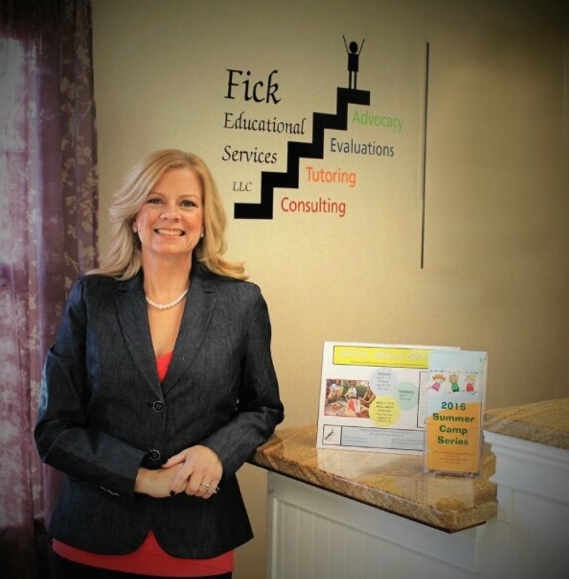This blog was written by Erin Pasela, mother of two sons and the newest Education Advocate at Fick Educational Services.
In my previous blog article, I discussed the reasons why you might consider getting a neuropsychological evaluation for your child. Today, I will be outlining what you do with the results of the evaluation that has been uncovered about your child. Understanding this will help support your child.
*Take note of the scores in the report.
*What does the testing show about your child?
*Is your child at grade level, below grade level, or on grade level?
*How does your child process information? By reading, auditorily, or visually?
If your child has been struggling socially, tell the team about it. Social skills can be implemented. If a sensory break is needed during the day, add it to the child’s schedule. Does the child need one on one support during the day- not simply the one aide assigned to the classroom for other students? Document as much data as you can to provide to the school, if needed. This will be helpful in advocating for additional needs for your child.
If you have noticed that your child is making little or no progress and your child’s IEP goals have not been met, perhaps some data in the neuropsychological evaluation will point to the reasons. For example, your child may have an occupational therapy goal for handwriting and yet, your child is not using capitalization and punctuation correctly. If the child continues to make little to no progress, it might be due to a diagnosis listed in the neuropsychological evaluation such as dysgraphia. In some cases, assistive technology would be an alternative to handwriting work and would remove the struggle with handwriting.
Once the recommendations have been implemented and data has been collected, what’s next? If your child is supported and making progress, then you have done a great job advocating for your child-congrats! But what if the school has implemented the recommendations and there are no other recommendations to utilize, or you child continues to struggle? Continue to meet with the team and revise the IEP. I cannot stress this enough. You can request an IEP meeting at any time, as many as necessary. There is no limit. If the specially designed instruction (SDI) needs to be addressed, add more instruction to help your child. If everything has been exhausted and there are no other available alternatives, then it may be time to advocate for your child to go to a different setting or school to meet their needs. Typically, if the IEP team decides that the current setting cannot meet your child’s educational needs under The Rehabilitation Act of 1973, and FAPE, Free Appropriate Public Education, the district may be obligated to pay for alternative school/setting at the district’s expense. These guidelines guarantee the educational entitlement of all students in the United States of America including Individuals with Disabilities Education Act, (IDEA).
If the next step is to advocate for your child to be placed in a more appropriate educational setting, note the items listed that may be beneficial to your child’s learning environment.
*Start researching Approved private schools that may fit your child’s needs. https://www.education.pa.gov/Documents/K-12/Special%20Education/APS%20Directory.pdf
*Request a school that specializes in your child’s specific disability, so the school staff has a better understanding how to work with your child.
*Requesting a smaller classroom size can be a huge benefit and more individualized for your child’s needs.
*If your child experiences emotional dysregulation, look at schools and their specialized crisis intervention to get a better understanding of the school’s protocols.
Keep doing what you are doing for your child and continue to advocate. You are the expert of your child. You know what your child needs and may need to do research on your own to get your child’s needs met.
As an advocate, I have supported parents/caregivers through the process and know how to keep the lines of communication open in the varying stages of an IEP meeting and support communication between the parent and school. Working with the team will benefit your child and provide positive outcomes.
| If you are looking for more support through this process, please reach out to Fick Educational Services. Schedule a free 15 minute call to explore how we can support you through this process. https://calendly.com/fickeducation/15min?month=2023-08 |

 Fick Educational Services is devoted to the educational needs of the children through individualized learning plans, tutoring and advocacy.
Fick Educational Services is devoted to the educational needs of the children through individualized learning plans, tutoring and advocacy.

